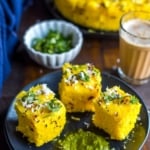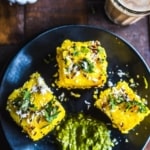Spongy, savory, and with a touch of sweetness, Gujarati nylon khaman dhokla is a light-weight and healthy anytime snack. Get this failproof recipe to make this soft and fluffy khaman within the Quick Pot.
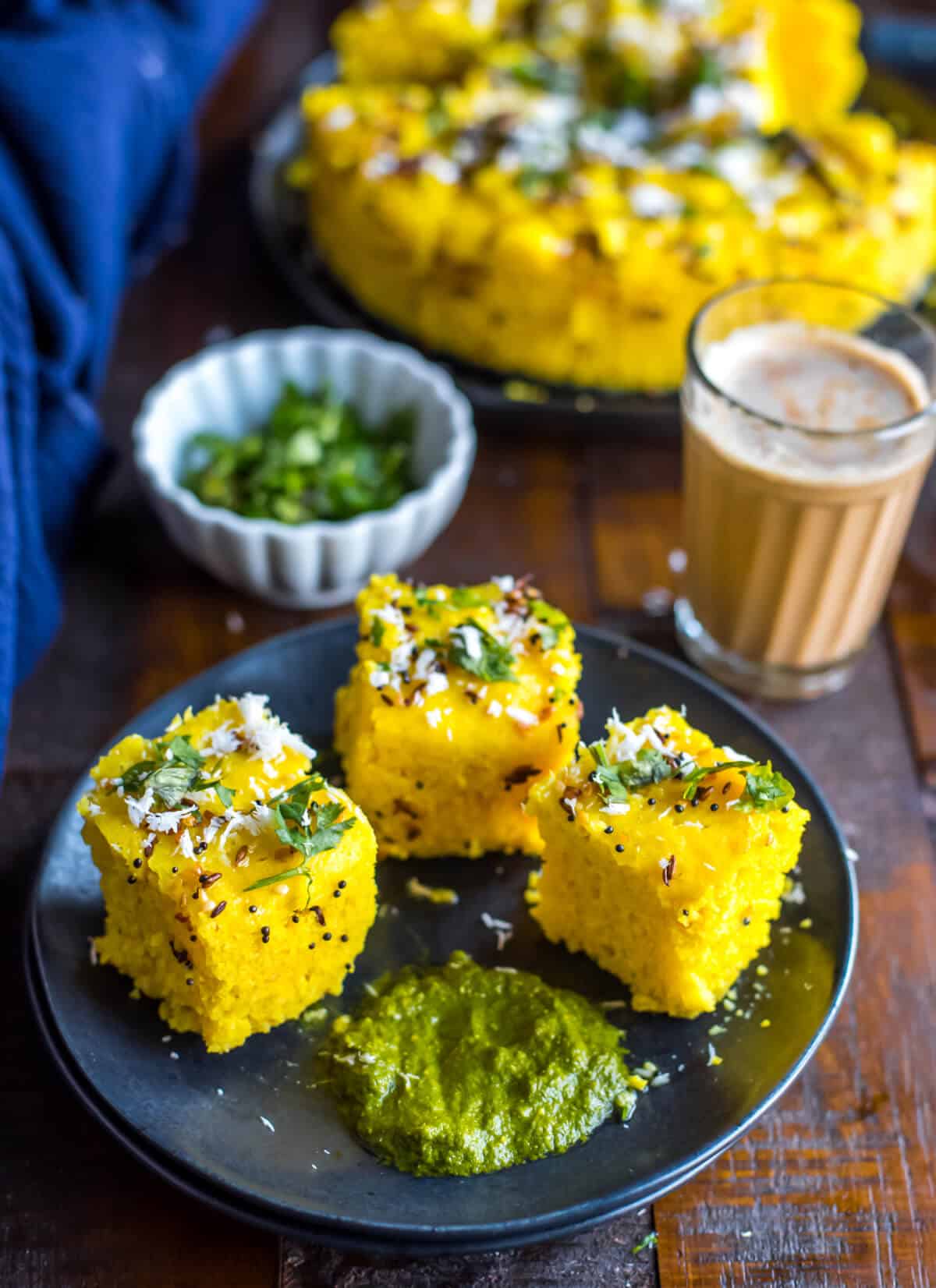
What’s khaman?
I grew up in a predominantly Gujarati-speaking neighborhood, which meant I had easy accessibility to spongy khaman, rava dhokla, Gujarati dal, kadhi, via my friend’s lunch boxes or the neighborhood store.
Amongst all of the Gujarati food, khaman was my absolute favorite. When you never had this dish, imagine a shiny yellow savory cake that’s soft and fluffy. While you take a bite of this steamed cake together with green chutney, it just melts away in your mouth.
Traditionally, this dish is made by soaking chana dal in water for a couple of hours before grinding it to a superb paste. This paste is mixed with yogurt and left overnight to ferment. It’s then cooked by steaming and finished by adding a tempering of oil, spices, sugar, and water.
In recent times, though, most folk prefer this fast version – as an alternative of soaking and grinding chana dal, they use besan or Bengal gram flour. Hence the name of the dish – Quick Khaman.
Don’t mistake this for rava dhokla, they’re two very different dishes, and you’re about to learn the way..
What’s the difference between khaman and dhokla?
Each dhokla and khaman (also called nylon dhokla) are two different dishes originating from Gujarat. Most individuals (including me) use the names interchangeably, but khaman and dhokla usually are not one and the identical, as I learned from my Gujarati friends. They taught me that these two are very different dishes with different ingredients.
Listed below are the differences:
- Ingredients: Dhokla batter is constructed from a mix of rice and lentils, whereas khaman is constructed from a batter of gram flour (besan in Hindi).
- Color: There may be a difference in the colour of the 2 dishes, too. While is , is in color.
- Texture: Khaman is soft, spongy, and has a melt-in-the-mouth texture, which is why it’s referred to as nylon khaman. Dhokla might be spongy as well but is a tad bit denser than khaman.
Of the 2, khaman is more commonly sold available in the market and is most also known as Dhokla, which, after all, is the fallacious name for the dish.
Alternate names: Yellow dhokla, Besan dhokla, Quick dhokla, Gujarati Nylon khaman
Reasons to like this recipe
Listed below are the numerous reasons we love this khaman dhokla recipe
- This spongy dhokla makes for an ideal snack that comes together in half-hour.
- It’s ideal for parties, making it a convenient make-ahead option.
- The sweet and savory taste and cake-like texture make this fast dhokla a success amongst adults and children!
Find out how to make Gujarati khaman dhokla in Quick Pot
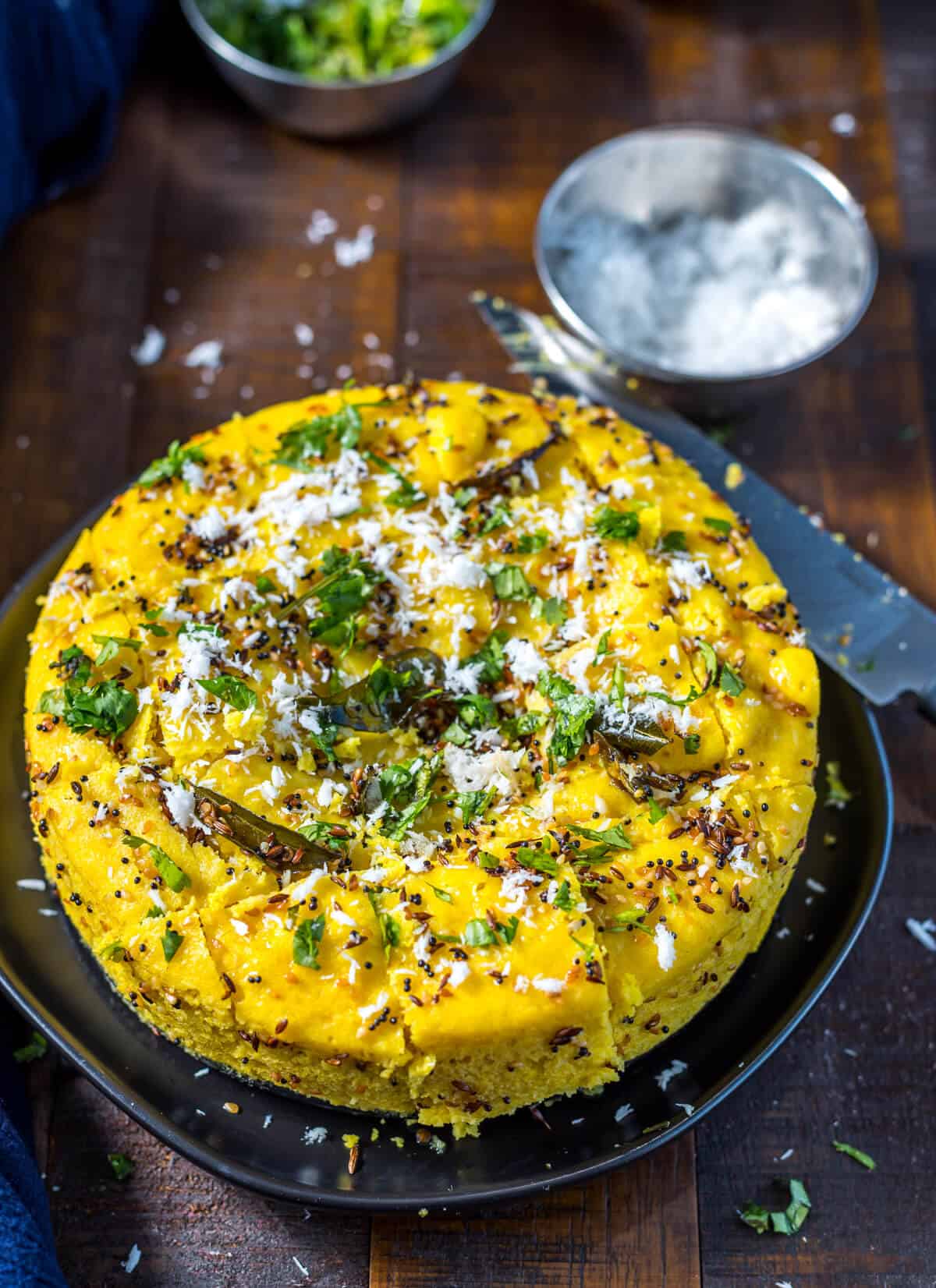
Those that have tried making nylon khaman will clearly understand what I mean once I say this – There are several things that may go fallacious, reminiscent of
- The khaman doesn’t rise and finally ends up being dense.
- The khaman doesn’t cook through.
- The dish has a bitter aftertaste.
Don’t worry – this recipe has been tested multiple times, and I’ll share my suggestions with you so that you simply never have a failed dish.
Expert Suggestions
- Gram flour shouldn’t be similar to chickpea flour: Avoid using chickpea flour; it’s not similar to gram flour. Gram flour is derived from split black chickpeas (chana dal), whereas chickpea flour is constructed from garbanzo beans (or safed chana). To know these pulses higher, take a look at this text – Pulses 101. I like to recommend sticking to gram flour for the authentic recipe.
- Add Eno fruit salt just before steaming: All the time remember so as to add Eno fruit salt just before steaming. Immediate steaming is crucial for correct batter rising.
- Use a fresh batch of Eno: The fundamental ingredient that makes the Khaman soft and spongy is fruit salt. Don’t use it if it is just too old. Ideally, if you add fruit salt, the batter should turn into light and airy. This means that the fruit salt has done its magic. If that doesn’t occur, use a latest batch of fruit salt.
- Check for doneness: Insert a toothpick into the middle of the Khaman. If it doesn’t come out clean, steam it for an extra 3-4 minutes until thoroughly cooked.
- Watch out for expired gram flour: In case your Khaman has an odd aftertaste, it could be because of expired gram flour. Use a fresh batch next time.
- Covered vs. uncovered cooking: I like to recommend making Khaman uncovered because the batter rises because it cooks. When you prefer covering, use a deeper bowl to avoid it sticking to the foil or lid.
- Steam valve position: The steam valve must be set to venting to copy the steaming function involved in traditionally making khamans. When you set the valve to sealing, the khaman finally ends up a tad bit denser.
- Generous water in tempering: Add 1/2 cup of water within the tempering, although it might sound excessive. This water helps achieve the soft, spongy, and melt-in-the-mouth texture characteristic of nylon Khaman. And don’t worry; the khaman will absorb all of the water in a couple of minutes. Just ensure that to distribute that tempering evenly, and don’t miss the perimeters!
Step-by-step instructions
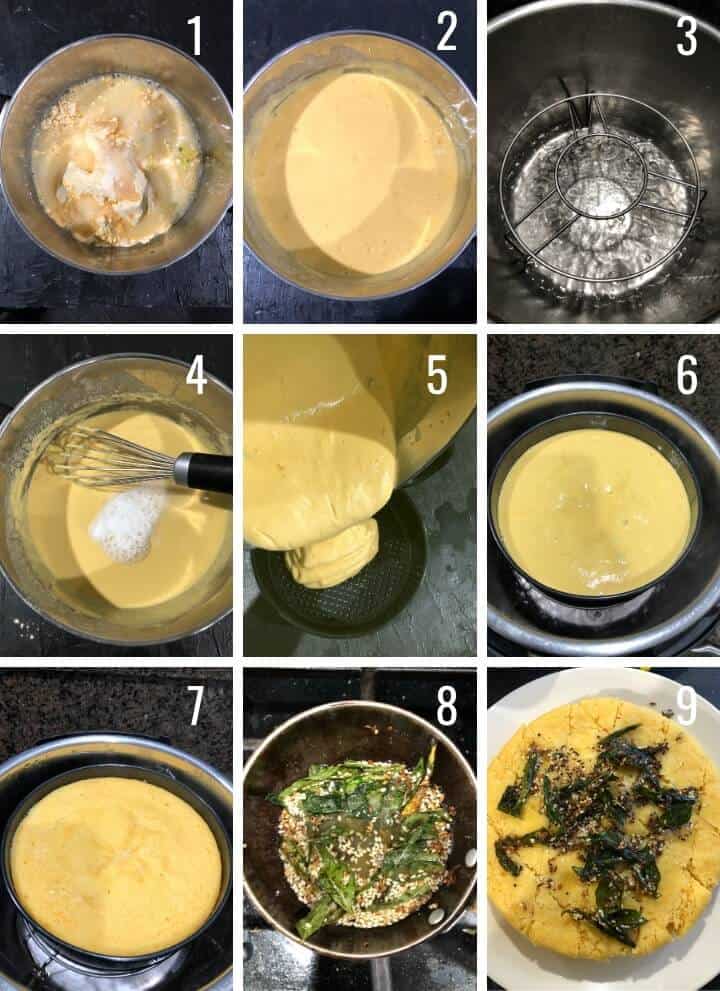
Preparing the khaman batter
- Grease a 7-inch springform pan or a steel bowl either using oil or cooking spray.
- Add gram flour, semolina, sugar, turmeric powder, citric acid crystals, green chili, ginger, oil, salt, and water in a mixing bowl. Use a whisk to mix them right into a lump-free batter.
Steaming khaman
- Add 2.5 cups of water to the Quick Pot, click on the Saute function, and set it to the ‘More’ mode. Once the water involves a boil, hit warm/cancel.
- Add the Eno fruit salt to the batter and blend it in till it gets incorporated into the batter. Don’t overmix.
- Transfer the batter to the springform pan.
- Place the trivet within the steel inner pot together with the springform pan. Cover the Quick Pot with the lid and set the valve to the venting position.
- Select the ‘Steam’ function and adjust the pressure to high. Set an external timer to twenty minutes. [Note: When the steam valve is in the venting position, the Instant Pot timer will not work]
- Once the external timer indicates the time is up, hit the cancel button within the Quick Pot.
- Wait for five minutes, after which open the lid.
- Insert a toothpick right in the middle of the khaman. If it doesn’t come out clean, steam the khaman for an extra 3-4 minutes till it’s thoroughly cooked.
- Remove the pan fastidiously using tongs. If using a springform pan, unhinge the clasp and take away the edges.
- When you usually are not using a springform pan, run over the perimeters of the pan with a pointy knife and invert the khaman over a plate. Lift the pan off the khaman.
- When you prefer the smoother surface to be on top, invert the khaman yet one more time by keeping a plate on top of the khaman. Rigorously hold each plates together and flip the underside plate to the highest.
- Remove the plate and cut the khaman into square or diamond shapes.
Tempering process
- Add oil to a small pan and set it on medium heat.
- Once the oil is hot, add mustard and cumin seeds, and after they begin to crackle, add asafoetida, green chilies, sesame seeds, and curry leaves.
- When the sesame starts to brown in about 10-15 seconds, take the pan off the warmth.
- Add water and sugar into the pan and blend well.
- Pour this tempering mixture evenly over the khaman using a spoon.
- Give the khaman about 5 minutes to take in all of the water and soften up.
- Garnish with grated coconut and finely chopped cilantro.
- Serve with green chutney.
Variations and substitutions
- Eno substitute – When you don’t have Eno fruit salt, substitute it with 1/2 teaspoon citric acid + 1/2 teaspoon baking soda. Nonetheless, I personally prefer using Eno because it imparts a greater taste and fluffier texture to the dish.
- Citric acid substitute – The recipe calls for 1/2 teaspoon of citric acid, and it will probably be substituted with 2 tablespoons of lemon or lime juice.
Serving suggestions
Serve this fast Khaman Dhokla together with your selection of cilantro chutney or tamarind chutney—it’s a delicious pairing either way!
Prep and storage instructions
This besan dhokla is a superb selection for a celebration snack. You’ll be able to prepare it a couple of days upfront, and it can maintain its delicious taste.
Prep ahead – I actually have also frozen leftover khaman previously with none significant impact on the taste. To freeze, place it in an airtight freezer-safe container. You’ll be able to reheat it within the microwave without thawing.
Reheating instructions – Warm the leftover dhokla within the microwave or steam it for a couple of minutes before serving.
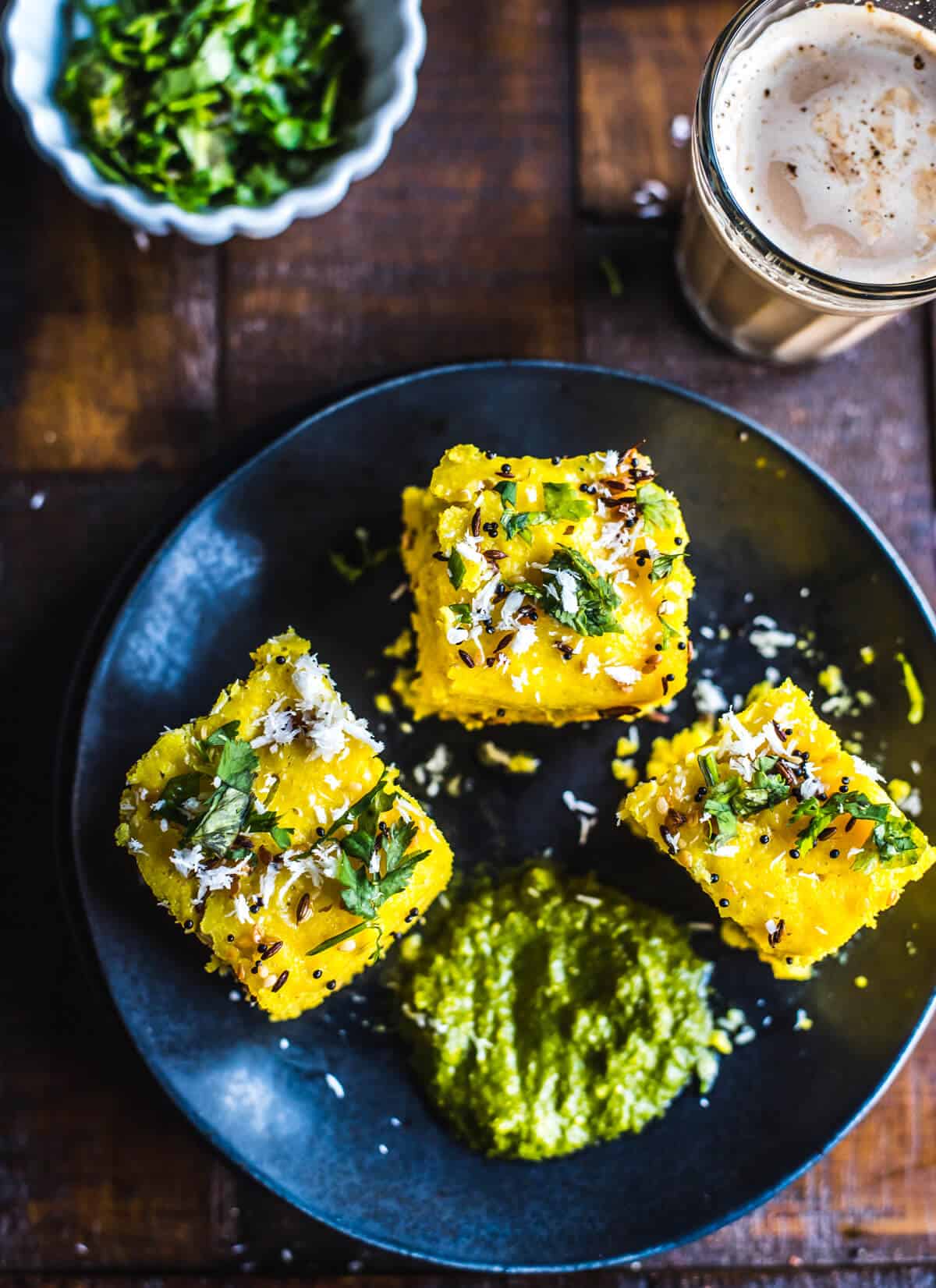
When you are on the lookout for easy and delicious Indian breakfast recipes, listed below are my top picks,
- Lemon vermicelli – This delicious and tangy Semiya Upma (Lemon Vermicelli) is just what you want to start your day. It’s filling and comes together in quarter-hour from start to complete.
- Sooji ka upma – a semolina-based breakfast dish that takes lower than half-hour.
- Idli – You’ll love this post if you’ve gotten been struggling to get soft and spongy idlis. Learn all my suggestions and tricks to get perfect fermented batter even in winter!
- Buttermilk dosa – Buttermilk dosa – Delicious and soft, this dosa is ideal for breakfast, snacks, and even lunch. Learn learn how to make it in a couple of easy steps.
- Quick Rava idli – Here’s a quick recipe to enjoy those lovely, soft, fluffy fast rava idlis each time the mood strikes. Serve with coconut or peanut chutney for a delicious and healthy meal.
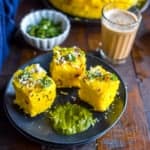
Quick Gujarati Khaman Dhokla Recipe
Spongy, savory, and with a touch of sweetness, Gujarati nylon khaman dhokla makes for an ideal breakfast or snack. Get this failproof recipe to make this fast dhokla in your Quick Pot.
Pin Print Save Email- 1.5 cups Bengal gram flour Besan
- 1.5 tablespoons superb semolina rawa
- 0.5 teaspoon turmeric powder
- 1 tablespoon sugar
- 0.5 teaspoon citric acid crystals nimbu ke phool
- 1 green chili finely chopped
- 1 inch piece ginger grated
- 1 teaspoon oil avocado or peanut
- 1 teaspoon salt
- 1 cup water for the batter
- 1.5 teaspoons fruit salt or Eno
- 2.5 cups water for steaming
For garnishing
- ¼ cup finely chopped cilantro/coriander leaves
- 1 tablespoon grated coconut optional
Prevent your screen from going dark
Preparing the batter
- Grease a 7-inch springform pan or a steel bowl either using oil or cooking spray.
Add gram flour, semolina, sugar, turmeric powder, citric acid crystals, green chili, ginger, oil, salt and water in a mixing bowl. Use a whisk to mix them right into a lump-free batter.
Steaming
Add 2 cups of water within the Quick Pot and click on on the Saute function and set it to the ‘More’ mode. Once the water involves a boil, hit warm/cancel.
Add the Eno fruit salt to the batter and blend it in till it gets incorporated into the batter. Don’t over mix.
Transfer the batter into the springform pan.
Place the trivet within the steel inner pot together with the springform pan. Cover the Quick Pot with the lid and set the valve to the venting position.
Select the ‘Steam’ function and adjust the pressure to high. Set an external timer to twenty minutes. [Note: When the steam valve is in the venting position, the Instant Pot timer will not work]
Once the external timer indicates the time is up, hit the cancel button within the Quick Pot.
Wait for five minutes after which open the lid.
Insert a toothpick right in the middle of the khaman. If it doesn’t come out clean, steam the khaman for an extra 3-4 minutes till it’s thoroughly cooked.
Remove the pan fastidiously using tongs. If using a springform pan, unhinge the clasp and take away the edges.
When you usually are not using a springform pan, run over the perimeters of the pan with a pointy knife and invert the khaman over a plate. Lift the pan off the khaman.
When you prefer a smoother surface on top, invert the Khaman over again. Place a plate on top of the khaman and thoroughly hold each plates together. Flip the underside plate to the highest.
Remove the plate and cut the khaman into diamond or square shapes.
Tempering process
Add oil to a small pan and set it on medium heat.
Once the oil is hot, add mustard and cumin seeds and after they begin to crackle, add asafoetida, green chilies, sesame seeds, and curry leaves.
When the sesame starts to brown in about 10-15 seconds, take the pan off the warmth.
Add water and sugar into the pan and blend well.
Pour this tempering mixture evenly over the khaman using a spoon.
Give the khaman about 5 minutes to take in all of the water and soften up.
Garnish with grated coconut and finely chopped cilantro.
Serve warm with green chutney.
Substitutions/variations
-
- Eno substitute – When you don’t have Eno fruit salt, substitute it with 1/2 teaspoon citric acid + 1/2 teaspoon baking soda. Nonetheless, I personally prefer using Eno because it imparts a greater taste and fluffier texture to the dish.
-
- Citric acid substitute – The recipe calls for 1/2 teaspoon of citric acid, and it will probably be substituted with 2 tablespoons of lemon or lime juice.
Expert Suggestions
-
- Gram flour shouldn’t be similar to chickpea flour: Avoid using chickpea flour; it’s not similar to gram flour. Gram flour is derived from split black chickpeas (chana dal), whereas chickpea flour is constructed from garbanzo beans (or safed chana). To know these pulses higher, take a look at this text – Pulses 101. I like to recommend sticking to gram flour for the authentic recipe.
-
- Add Eno fruit salt just before steaming: All the time remember so as to add Eno fruit salt just before steaming. Immediate steaming is crucial for correct batter rising.
-
- Use a fresh batch of Eno: The fundamental ingredient that makes the Khaman soft and spongy is fruit salt. Don’t use it if it is just too old. Ideally, if you add fruit salt, the batter should turn into light and airy. This means that the fruit salt has done its magic. If that doesn’t occur, use a latest batch of fruit salt.
-
- Check for doneness: Insert a toothpick into the middle of the Khaman. If it doesn’t come out clean, steam it for an extra 3-4 minutes until thoroughly cooked.
-
- Watch out for expired gram flour: In case your Khaman has an odd aftertaste, it could be because of expired gram flour. Use a fresh batch next time.
-
- Covered vs. uncovered cooking: I like to recommend making Khaman uncovered because the batter rises because it cooks. When you prefer covering, use a deeper bowl to avoid it sticking to the foil or lid.
-
- Steam valve position: The steam valve must be set to venting to copy the steaming function involved in traditionally making khamans. When you set the valve to sealing, the khaman finally ends up a tad bit denser.
-
- Generous water in tempering: Add 1/2 cup of water within the tempering, although it might sound excessive. This water helps achieve the soft, spongy, and melt-in-the-mouth texture characteristic of nylon Khaman. And don’t worry; the khaman will absorb all of the water in a couple of minutes. Just ensure that to distribute that tempering evenly, and don’t miss the perimeters!
Disclaimer: Approximate dietary information is provided as a courtesy and may vary depending on the precise ingredients/brands used. If you’ve gotten health issues, please work with a registered dietician or nutritionist.
Serving: 1pieceCalories: 190kcalCarbohydrates: 27gProtein: 7gFat: 6gSaturated Fat: 3gSodium: 511mgPotassium: 261mgFiber: 5gSugar: 8gVitamin A: 101IUVitamin C: 27mgCalcium: 18mgIron: 2mg
Food regimen: Vegan
Course: Breakfast
Method: Quick Pot
Cuisine: Indian
This post was originally written on Jan 7, 2020, and was republished with additional information on Oct 11, 2021, and Dec 8, 2023.


